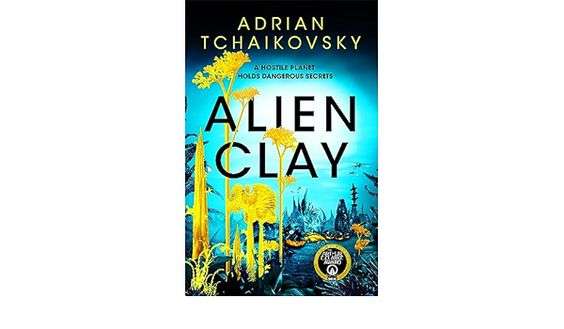Alien Clay by Adrian Tchaikovsky
Tor, HB, £18.99
Reviewed by Nadya Mercik

A journey into otherness. A tale of confrontation – with the authorities, with the world around you, with yourself. A vibrant alien world steeped in science. And the same old traits of humanity that bring people onto the verge of catastrophe. Alien Clay by Adrian Tchaikovsky is another revolutionary adventure on an exoplanet with its own rules and paradigm, which humans try to reshape and make use of.
Arton Dagdev has finally been caught after a year of lying low as a revolutionary. He is sent to one of the Labour camps on an exoplanet. When he arrives, he is lucky to get a good deal. Thanks to his credentials as an ecologist and biologist, he is put into Dig Support. It’s a way down on the career ladder – most of the things he has to do are at the level of a lab assistant or a beginning researcher. It is still better than other tasks, though. The Camp Commandant hopes that Arton will help them solve the mystery of local artefacts – the tall dolmens that have writings on them. The problem is there are no traces of those who could have erected them.
As Daghdev is studying local biology, which is based on symbiosis, he is invited to join the local Revolutionary Subcommittee. Risking his cosy position, he helps them to stage a coup, which fails. Most of the top leaders are executed, while Dagdev is sent into Excursions – the special teams that go out of the dome to clean the territory around the newly found artefacts. That’s when Arton’s real acquaintance with the local world begins.
The two main premises of the story constantly feed each other. As expected, Alien Clay boasts amazing worldbuilding. We are all familiar with the principle of symbiosis, but Tchaikovsky brings it to the next level and gives it a different scope, which creates a truly alien atmosphere. The constant attempts of the scientists to classify the local critters and their search for the Kiln man in accordance with Mandate’s vision only accentuate the otherness and human troubles accepting it.
The revolutionary arc gives us a whole bunch of flawed and conflicted characters – they might not be that likeable, but sooner or later, you get to empathise with them. Back on Earth and in Kiln, people are fighting against the Mandate – the authorities who separate everything into black and white, acceptable and unacceptable. Be it a desire to improve working conditions or an unprecedented scientific view, the Mandate is going to prune it out. The premise works especially well with science, which can’t be limited to one paradigm as long as it keeps looking for truths. I loved how it epitomised in the scene where the lead Scientist presents an approximation of the Kiln Man because they have to show some progress in their findings. And what they give looks like a caricature – a satirical way of thinking of an alien, and, as a result, the Mandate.
The plot of the story is tight and well-constructed. There are revelations and twists about the characters and the planet. But, in my opinion, the strong point of the story is its analysis of and pondering on human nature. What is it to be human? How does it feel to face a huge world and be a solitary sand grain in it? How do you cut the corners? How do you encompass it all? How do you stay yourself? What direction do you move in? It’s about openness fighting the survival instinct. The eternal questions are made into a story of revolution and cognition.
